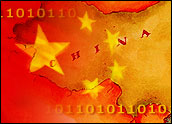
China’sState Administration for Industry and Commerce on Tuesday launched the latest in a series of investigations against Microsoft for possible violations of the country’s antimonopoly law.
Back in July 2014, about 100 SAIC officialsburst into four Microsoft offices in various parts of China and copied contracts and records, downloaded data from company servers, and questioned executives.
The latest probe seeks answers to major questions arising from the data seized, according to news reports.
“We’re serious about complying with China’s laws and committed to addressing the SAIC’s questions and concerns,” a Microsoft spokesperson said in a statement sent to the E-Commerce Times by Chelsea Rauch of WE.
What Seems to Be Happening
SAIC wants Microsoft to submit a complete explanation for problems discovered in the data, according to reports.
In 2014, the company was suspected of not fully disclosing information about the Windows OS and Microsoft Office applications, causing incompatibility problems. Under Chinese law, introducing incompatibilities without advance warning to users could be considered anticompetitive behavior.
The 2014 raids hit Microsoft offices in Beijing, Liaoning, Fujian and Hubei, as well as the Dalian officers of IT consultancy Accenture, which reportedly performs financial work for Microsoft on an outsourced basis.
China had suspected Microsoft of violating its antimonopoly laws since June 2013 regarding compatibility problems, bundling and document authentication for its Windows OS and Microsoft Office applications, the SAIC said in 2014.
“Microsoft has always been a favorite target worldwide for antitrust action, some of it well deserved and some of it not,” said Laura DiDio, a research director atStrategy Analytics. “The EU, for instance, has repeatedly gone after them.”
Is It Politics, or Just Business?
The 2014 raids followed China’s banning government computers from using Windows 8 after whistleblower Edward Snowden’s revelations of the U.S. National Security Agency’s surveillance activities raised concerns about security.
They also came shortly before Microsoft’s Xbox One became the first gaming console to be released in China since Beijing banned console sales in 2000.
China has been cracking the whip on American companies in general, DiDio told the E-Commerce Times. “It’s not just Microsoft, it’s Google, Qualcomm and others as well.”
The actions against Microsoft were sparked by a complaint fromKingsoft, which develops the freeware Microsoft Office-compatible Kingsoft Office suite, according to an undatedreport from PaRR.
Kingsoft has relationships with IBM, Dell and Intel, and there have been complaints that in some cases its apps aren’t compatible with Windows or Microsoft Office.
SAIC received a complaint from an unnamed company in June 2013 alleging Microsoft had failed to fully disclose information related to the Windows OS and the Microsoft Office suite, creating problems with interoperability, tie-in sales and document certification, PaRR reported.
What’s at Stake for Microsoft
“The timing of this probe is pretty suspicious because Microsoft recently signed partnership agreements with a number of Chinese companies,” DiDio said.
These include state-owned China Electronics Technology Group and Baidu.
Microsoft has staked its future on Windows 10, which it aims to have running on more than 1 billion devices worldwide within two to three years.
That ups the stakes for Microsoft because “it needs the Chinese market, the Japanese market, India,” DiDio pointed out. “Microsoft won’t get to those numbers with the U.S. and Europe alone.”
The company might have to knuckle under eventually because “this goes into gaming and entertainment where China can throw up huge roadblocks,” she suggested. “China could hit Xbox sales as well.”























































Gee maybe China should look at Apple too? Or how about Google the king of anti competitive behavior. Most companies have some sort of proprietary function to it. That is what set’s it apart from the rest. If you want open type stuff you don’t buy closed end stuff. But given that so much open software runs on Windows I AM not sure what China means by anti competitive? China has no business talking open about anything. Or being anti competitive. China is clearly the kettle calling to pot black.